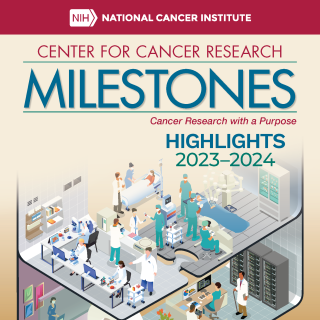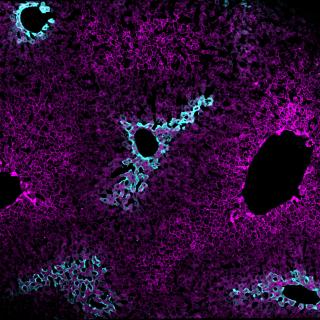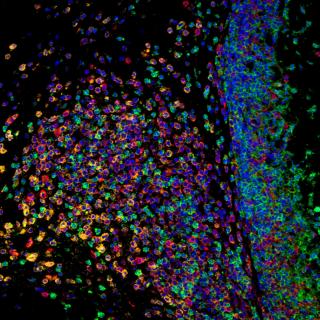News and Events
Proteins Released from the Nuclei of Dying Cancer Cells Promote Tumor Growth
Material released from dying cancer cells, known as tumor cell nuclear expulsion products (TuNEPs), contains specific proteins that promote the growth of neighboring cancer cells. Targeting these proteins could lead to new treatments that hinder cancer spread and improve patient outcomes.
Read MoreClinical trial researching prostate cancer in African American adults
Ismail Baris Turkbey, M.D., Senior Clinician in the Molecular Imaging Branch, is leading a clinical trial to study and improve diagnostic outcomes for prostate cancer in African American adults.
Read MoreIn Memoriam: C. Norman Coleman, M.D.
The CCR community is deeply saddened by the recent passing of C. Norman Coleman, M.D., Senior Investigator in the Radiation Oncology Branch.
Read MoreNew Milestones publication now available
Every year, CCR makes remarkable contributions to the understanding, detection, treatment and prevention of cancer. This issue of our annual publication, Milestones, features 10 of our top scientific advances from the past year. These discoveries fall everywhere on the spectrum from basic science to clinical research, ranging from a change in our understanding of how cells replicate and divide to the first FDA-approved treatment for a rare cancer based on the results of an NCI trial. Our researchers have developed a novel drug delivery system inspired by bacterial spores, identified prognostic gene signatures for patients with different cancers and gathered data over 30 years to show that an immunotherapy essentially cures a rare precancerous disease.
Read MoreNew research on liver cell diversity could help scientists understand tumor complexity
Hepatocytes, the main cell type in the liver, differ in function according to their location in the liver. A new study shows that mitochondrial responses to nutrients drive this diversity — a finding that could help researchers better understand tumor cell heterogeneity.
Read MoreClinical trial researching therapy for esophageal cancers
A clinical trial led by David S. Schrump, M.D., MBA., FACS, Chief and Senior Investigator in the Thoracic Surgery Branch, is researching a combination vaccine and drug therapy for esophageal cancers.
Read MoreNew biomaterial enhances cancer vaccine effectiveness to help eliminate cancer in mice
Scientists have created a new type of cancer vaccine approach that uses a biomaterial that attracts immune cells and localizes the delivery of the vaccines. In mice, the biomaterial combined with a cancer vaccine was able to cure 50 to 75% of their tumors.
Read MoreSteven Rosenberg receives AACR Award for Lifetime Achievement in Cancer Research
The American Association for Cancer Research (AACR) has awarded Steven A. Rosenberg, M.D., Ph.D., Chief of the Surgery Branch, the AACR Award for Lifetime Achievement in Cancer Research. He is being recognized for his paramount contributions to cancer research and patient care, most notably his pioneering research in establishing cancer immunotherapy as a major treatment strategy for many cancer types. He will receive the award at the 2024 AACR Annual Meeting.
Read MoreClinical trial researching BRCA1-Associated Protein-1 mutations
A clinical trial led by David S. Schrump, M.D., M.B.A., FACS, Chief and Senior Investigator in the Thoracic Surgery Branch, is researching a combination drug therapy for BRCA1-Associated Protein-1 mutations.
Read MoreClinical trial researching therapy for B-cell lymphoma
A clinical trial led by Kathryn A. Lurain, M.D., M.P.H., Assistant Research Physician in the HIV and AIDS Malignancy Branch, is researching a drug for B-cell lymphoma.
Read MoreCelebrating CCR Careers: Jonathan R. Keller, Ph.D.
Jonathan R. Keller, Ph.D., an experimental hematologist who discovered interleukin-3 (IL-3) and explored the factors that give rise to leukemia, announces his retirement.
Read More








